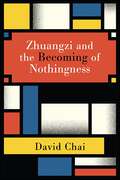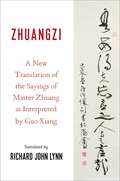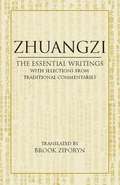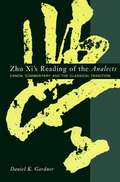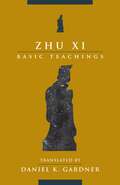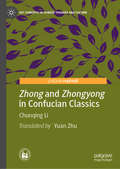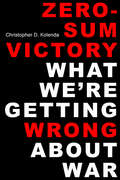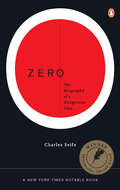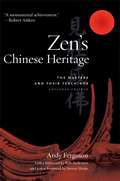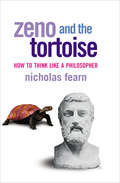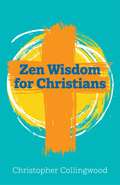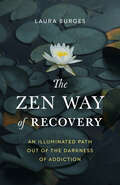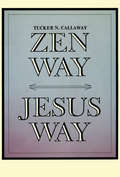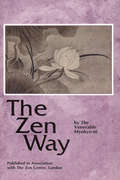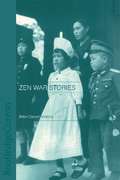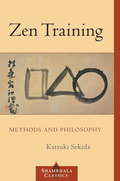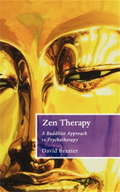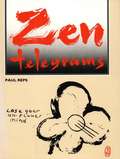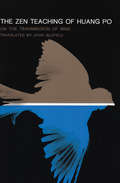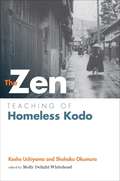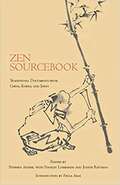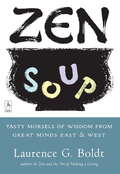- Table View
- List View
Zhuangzi and the Becoming of Nothingness (SUNY series in Chinese Philosophy and Culture)
by David ChaiZhuangzi and the Becoming of Nothingness offers a radical rereading of the Daoist classic Zhuangzi by bringing to light the role of nothingness in grounding the cosmological and metaphysical aspects of its thought. Through a careful analysis of the text and its appended commentaries, David Chai reveals not only how nothingness physically enriches the myriad things of the world, but also why the Zhuangzi prefers nothingness over being as a means to expound the authentic way of Dao. Chai weaves together Dao, nothingness, and being in order to reassess the nature and significance of Daoist philosophy, both within its own historical milieu and for modern readers interested in applying the principles of Daoism to their own lived experiences. Chai concludes that nothingness is neither a nihilistic force nor an existential threat; instead, it is a vital component of Dao's creative power and the life-praxis of the sage.
Zhuangzi: A New Translation of the Sayings of Master Zhuang as Interpreted by Guo Xiang (Translations from the Asian Classics)
by Richard John LynnThe Zhuangzi (Sayings of Master Zhuang) is one of the foundational texts of the Chinese philosophical tradition and the cornerstone of Daoist thought. The earliest and most influential commentary on the Zhuangzi is that of Guo Xiang (265–312), who also edited the text into the thirty-three-chapter version known ever since. Guo’s commentary enriches readings of the Zhuangzi, offering keen insights into the meaning and significance of its pithy but often ambiguous aphorisms, narratives, and parables.Richard John Lynn’s new translation of the Zhuangzi is the first to follow Guo’s commentary in its interpretive choices. Unlike any previous translation into any language, its guiding principle is how Guo read the text; Lynn renders the Zhuangzi in terms of Guo’s understanding. This approach allows for the full integration of the text of the Zhuangzi with Guo’s commentary. The book also features a translation of Guo’s complete interlinear commentary and is annotated throughout.A critical introduction includes a detailed account of Guo’s life and times as well as analysis of his essential contributions to the arcane learning (xuanxue) of the fourth century and the development of Chinese philosophy. Lynn sheds new light on how the Daoist classic, which has often been seen as a timeless book of wisdom, is situated in its historical context, while also considering it as a guide to personal cultivation and self-realization.
Zhuangzi: With Selections from Traditional Commentaries
by Zhuangzi Brook ZiporynIdeal for students and scholars alike, this edition of Zhuangzi (Chuang Tzu) includes the complete Inner Chapters, extensive selections from the Outer and Miscellaneous Chapters, and judicious selections from two thousand years of traditional Chinese commentaries, which provide the reader access to the text as well as to its reception and interpretation. A glossary, brief biographies of the commentators, a bibliography, and an index are also included.
Zhu Xi's Reading of the Analects: Canon, Commentary, and the Classical Tradition
by Daniel GardnerThe Analects is a compendium of the sayings of Confucius (551–479 b.c.e.), transcribed and passed down by his disciples. How it came to be transformed by Zhu Xi (1130–1200) into one of the most philosophically significant texts in the Confucian tradition is the subject of this book.Scholarly attention in China had long been devoted to the Analects. By the time of Zhu Xi, a rich history of commentary had grown up around it. But Zhu, claiming that the Analects was one of the authoritative texts in the canon and should be read before all others, gave it a still more privileged status in the tradition. He spent decades preparing an extended interlinear commentary on it. Sustained by a newer, more elaborate language of metaphysics, Zhu's commentary on the Analects marked a significant shift in the philosophical orientation of Confucianism—a shift that redefined the Confucian tradition for the next eight centuries, not only in China, but in Japan and Korea well.Gardner's translations and analysis of Zhu Xi's commentary on the Analects show one of China's great thinkers in an interesting and complex act of philosophical negotiation. Through an interlinear, line-by-line "dialogue" with Confucius, Zhu effected a reconciliation of the teachings of the Master, commentary by later exegetes, and contemporary philosophical concerns of Song-dynasty scholars. By comparing Zhu's reading of the Analects with the earlier standard reading by He Yan (190–249), Gardner illuminates what is dramatically new in Zhu Xi's interpretation of the Analects.A pioneering study of Zhu Xi's reading of the Analects, this book demonstrates how commentary is both informed by a text and informs future readings, and highlights the importance of interlinear commentary as a genre in Chinese philosophy.
Zhu Xi: Basic Teachings
by Xi ZhuZhu Xi (1130–1200) was the preeminent Confucian thinker of the Song dynasty (960–1279). His teachings profoundly influenced China, where for centuries after his death they formed the basis of the country’s educational system. In Korea, Japan, and Vietnam as well, elites embraced his inspired and authoritative synthesis of Confucian thought.In Zhu’s eyes, the great Way of China was in decline, with its very survival threatened by external enemies and internal moral weakness. In his writings and teaching, Zhu took as his mission the revival of the Confucian tradition, the source of China’s greatness, and its transmission to future generations. For him, restoring Confucianism to its rightful place required drawing on the tradition’s whole sweep, from the sacred texts of the sages and worthies of antiquity to the more recent writings of the great thinkers of the tenth and eleventh centuries.This book presents the essential teachings of the new Confucian (“Neo-Confucian”) philosophical system that Zhu Xi forged, providing a concise introduction to one of the most important figures in the history of Chinese thought. It offers selections from the Classified Conversations of Master Zhu (Zhuzi yulei), a lengthy collection of Zhu’s conversations with disciples. In these texts, Zhu Xi reflects on the Confucian teachings of the past, revising and refining his understanding of them and shaping that understanding into a cohesive system of thought. Daniel K. Gardner’s translation renders these discussions and sayings in a conversational style that is accessible to new and more advanced readers alike.
Zhong and Zhongyong in Confucian Classics (Key Concepts in Chinese Thought and Culture)
by Chunqing LiThis Key Concept pivot explores the trajectory of the semantic generation and evolution of two core concepts of ancient Chinese Confucianism, ‘Zhong’ (middle) and ‘Zhongyong’ (golden mean). In the pre-Qin period, Confucius advocated ‘middle line’ and ‘golden mean’ as the highest standards for gentlemanly behaviour and culture. In The Doctrine of the Mean the Confucian classic of the late Warring States Period, ‘middle’ obtained the ontological meaning of ‘great fundamental virtues of the world’, due to the influence of Taoism and Yinyang School. It became not only the norm of human behaviours, but also the law governing the operation of heaven and earth. Since then, idealist Confucian scholars of the Song and Ming dynasties have developed the meaning of ‘middle’ from the perspective of the relationships between heaven and man, a fundamental norm of Confucian ethics.
Zero-Sum Victory: What We're Getting Wrong About War
by Christopher D. KolendaThe military expert and author of Leadership presents &“the most thoughtful analysis yet of America&’s recent conflicts—and future challenges&” (Gen. Stanley A. McChrystal). Why have the major post-9/11 US military interventions turned into quagmires? Despite huge power imbalances in America&’s favor, capacity-building efforts, and tactical victories, the wars in Afghanistan and Iraq turned intractable. The US government&’s fixation on zero-sum, decisive victory in these conflicts is a key reason why these operations failed to achieve favorable and durable outcomes. In Zero-Sum Victory, retired US Army colonel Christopher D. Kolenda identifies three interrelated problems that have emerged from the government&’s insistence on zero-sum victory. First, the US government has no way to measure successful outcomes other than a decisive military victory, and thus, selects strategies that overestimate the possibility of such an outcome. Second, the United States is slow to recognize, modify, or abandon losing strategies. Third, once the United States decides to withdraw, bargaining asymmetries and disconnects in strategy undermine the prospects for a successful transition or negotiated outcome. Relying on historic examples and personal experience, Kolenda draws thought-provoking and actionable conclusions about the utility of American military power in the contemporary world—insights that serve as a starting point for future scholarship as well as for important national security reforms.
Zero: The Biography of a Dangerous Idea
by Charles SeifeThe Babylonians invented it, the Greeks banned it, the Hindus worshiped it, and the Church used it to fend off heretics. Now it threatens the foundations of modern physics. For centuries the power of zero savored of the demonic; once harnessed, it became the most important tool in mathematics. For zero, infinity's twin, is not like other numbers. It is both nothing and everything. In Zero, Science Journalist Charles Seife follows this innocent-looking number from its birth as an Eastern philosophical concept to its struggle for acceptance in Europe, its rise and transcendence in the West, and its ever-present threat to modern physics. Here are the legendary thinkers—from Pythagoras to Newton to Heisenberg, from the Kabalists to today's astrophysicists—who have tried to understand it and whose clashes shook the foundations of philosophy, science, mathematics, and religion. Zero has pitted East against West and faith against reason, and its intransigence persists in the dark core of a black hole and the brilliant flash of the Big Bang. Today, zero lies at the heart of one of the biggest scientific controversies of all time: the quest for a theory of everything. .
Zen's Chinese Heritage
by Tenshin Reb Anderson Steven Heine Andy FergusonZen's Chinese Heritage traces twenty-five generations of inlightened Buddhist teachers, supplementing their core teachings with history, biography, and poetry. The result is an intimate and profound human portrait of the enlightened Zen ancients, and an unprecedented look into the depths of the rich cultural heritage. In this new edition with even more valuable material, Ferguson surveys generations of Zen masters, moving chronologically through successive generations of ancestral teachers, supplementing their core teachings with history, biography, and starkly beautiful poetry. In addition to giving the reader the engaging sense of the "family history" of Zen, this uniquely valuable book paints a clear picture of the tradition's evolution as a religious, literary, and historical force.
Zeno and the Tortoise: How to Think Like a Philosopher
by Nicholas FearnFor those who don't know the difference between Lucretius's spear and Hume's fork, Zeno and the Tortoise explains not just who each philosopher was and what he thought, but exactly how he came to think in the way he did. Nicholas Fearn presents philosophy as a collection of tools — the tricks of a trade that, in the end, might just be all tricks, each to be fruitfully applied to a variety of everyday predicaments. In a witty and engaging style that incorporates everything from Sting to cell phones to Bill Gates, Fearn demystifies the ways of thought that have shaped and inspired humanity — among many others, the Socratic method, Descartes's use of doubt, Bentham's theory of utilitarianism, Rousseau's social contract, and, of course, the concept of common sense. Along the way, there are fascinating biographical snippets about the philosophers themselves: the story of Thales falling down a well while studying the stars, and of Socrates being told by a face-reader that his was the face of a monster who was capable of any crime. Written in twenty-five short chapters, each readable during the journey to work, Zeno and the Tortoise is the ideal course in intellectual self-defense. Acute, often irreverent, but always authoritative, this is a unique introduction to the ideas that have shaped us all. "Entertaining and witty. A smooth, sweet concoction that should tickle the taste buds of the most philosophobic readers." — Julian Boggini, The Times Educational Supplement (U.K.) "A concise and entertaining attempt to place the skills of philosophy at our fingertips." — Olivier Burckhardt, The Independent on Sunday (U.K.)
Zen Wisdom for Christians
by Christopher CollingwoodAs spiritual paths, Zen and Christianity can learn from one another. In this book, Anglican priest and Zen teacher Christopher Collingwood sets out how Zen can return Christians to their roots with renewed energy, and allow others to consider Christianity in a new and more favourable light. For the many Christians searching for a greater depth of spirituality, Zen offers a way to achieve openness. Drawing on Zen experience and the teachings of Jesus as depicted in the gospels, Zen Wisdom for Christians enables Christians to explore avenues of thought and experience that are fresh and creative. Using examples of Zen koans and Zen readings of Christian texts, the author provides a radical reorientation of life - away from one based on self-centredness and the notion of a separate, isolated self, to a way that is inclusive and at one with all.Zen Wisdom for Christians proves that the practice of Zen can lead Christians towards deeper spirituality and enhance religious experience through mutual appreciation, in a way that is truly eye-opening and life-changing.
The Zen Way of Recovery: An Illuminated Path Out of the Darkness of Addiction
by Laura BurgesAn accessible, compassionate guide to Buddhist principles and practices that can help support recovery from addictions and addictive behaviors—written by an experienced lay teacher with long-term recovery.For anyone struggling with addiction, Buddhism offers powerful, grounding wisdom and tools to help support recovery. In The Zen Way of Recovery, Laura Burges shares her experience as a dedicated Zen practitioner who came to terms with her own addiction to alcohol and found support for her recovery. Through the lens of Buddhist teachings, Burges offers tools and practices which, together with the help of recovery programs, can offer a road to sobriety. Burges is an experienced and compassionate guide, and her message is resonant for people with any type of addictive behavior—and for people who aren&’t necessarily familiar with Buddhism. Her teachings are drawn from the Buddha's life and teachings (specifically the Eight Awarenesses of the Awakened Being and the Six Paramitas), and the wisdom of Japanese Buddhist priest Dogen Zenji, the founder of the Soto school of Zen, among others. Burges emphasizes the importance of being in an active recovery program, and the teachings and practices she offers in each chapter—including reflections, journaling prompts, meditations, instructions for setting up and altar and zazen—are both a perfect adjunct and powerful reinforcement. Examples of reflections and journaling prompts include: Do you still hear the critical, contemptuous, sarcastic voice of a parent or partner in your own head?Do you sometimes hear yourself mirroring this negative voice with others?What were the models of relationship that you grew up with?What are ways that you can cultivate more patience?Check in with yourself to see if tiredness, hunger, loneliness, or anger is affecting your thinking in the moment.
Zen Way - Jesus Way
by Tucker N. CallawayThis groundbreaking book successfully fuses the two overlapping traditions of Zen Buddhism and Christianity.Very few Christians who are interested in Zen Buddhism understand the fundamentals of the religion itself. <P><P>Most of the books which are available on Zen are superficial and fraught with caricatures and erroneous generalizations - concentrating more on meditation than on the real essence of Zen. Now the Christian who has been waiting for a clear and thorough explanation of Zen in terms he can understand has been provided with Zen Way--Jesus Way--a unique inside look at Christianity and Zen Buddhism by Dr. Tucker N. Callaway, a committed Christian missionary who for twenty years has practiced zazen in Japanese temples in an effort to reach the heart of the faith.Calloway has a knack for making philosophical concepts clear to the general reader and begins Zen Way--Jesus Way by presenting the fundamental presuppositions of Zen and several of the concepts which are logically deduced from them. Next he relates some of his experiences in Buddhist temples, while explaining the practical applications of Zen philosophy. Finally he interprets the Jesus Way in a manner that makes possible a genuine comparison with the Zen way.
The Zen Way
by Myokyo-NiMyokyo-ni is the Buddhist name of Dr. Irmgard Schloegl, who directs the Zen center Shobo-an in London. Here she seeks to describe Zen and Zen practice from a few different approaches, presenting basic Buddhist thought as well as an overview of the life of the historical Buddha. She gives a section on training in a Japanese Rinzai Zen monastery-perhaps the most unique feature of the book, although her presentation is rather impersonal. Her final section, "Fundamentals," is rambling and might have benefited from further organization and subdivision. The author's style throughout is decidedly Western, with a psychological, philosophical tone that does not sit comfortably with some of the more esoteric writings in the field. For an introduction to the subject, there are better sources, such as Robert Aitken's Taking the Path of Zen (Farrar, 1982). For serious students of Zen, there are valuable insights hidden in the sometimes difficult but heartfelt analyses scattered through the book.
The Zen Way
by Myokyo-NiMyokyo-ni is the Buddhist name of Dr. Irmgard Schloegl, who directs the Zen center Shobo-an in London. Here she seeks to describe Zen and Zen practice from a few different approaches, presenting basic Buddhist thought as well as an overview of the life of the historical Buddha. She gives a section on training in a Japanese Rinzai Zen monastery-perhaps the most unique feature of the book, although her presentation is rather impersonal. Her final section, "Fundamentals," is rambling and might have benefited from further organization and subdivision. The author's style throughout is decidedly Western, with a psychological, philosophical tone that does not sit comfortably with some of the more esoteric writings in the field. For an introduction to the subject, there are better sources, such as Robert Aitken's Taking the Path of Zen (Farrar, 1982). For serious students of Zen, there are valuable insights hidden in the sometimes difficult but heartfelt analyses scattered through the book.
Zen War Stories (Routledge Critical Studies in Buddhism)
by Brian VictoriaFollowing the critically acclaimed Zen at War (1997), Brian Victoria explores the intimate relationship between Japanese institutional Buddhism and militarism during the Second World War.Victoria reveals for the first time, through examination of the wartime writings of the Japanese military itself, that the Zen school's view of life and death was deliberately incorporated into the military's programme of 'spiritual education' in order to develop a fanatical military spirit in both soldiers and civilians. Furthermore, that D. T. Suzuki, the most famous exponent of Zen in the West, is shown to have been a wartime proponent of this Zen-inspired viewpoint which enabled Japanese soldiers to leave for the battlefield already resigned to death. Victoria takes us onto the naval battlefield in the company of warrior-monk and Rinzai Zen Master Nakajima Genjô. We view the war in China through the eyes of a Buddhist military chaplain. The book also examines the relationship to Buddhism of Japan's seven Class-A war criminals who were hung by the Tokyo War Crimes Tribunal in 1948.A highly controversial study, this book will be of interest, first and foremost, to students of Zen as well as all those studying the history of this period, not to mention anyone concerned with the perennial question of the 'proper' relationship between religion and the state.
Zen Training: Methods and Philosophy
by Katsuki SekidaZen Training is a comprehensive handbook for zazen, seated meditation practice, and an authoritative presentation of the Zen path. The book marked a turning point in Zen literature in its critical reevaluation of the enlightenment experience, which the author believes has often been emphasized at the expense of other important aspects of Zen training. In addition, Zen Training goes beyond the first flashes of enlightenment to explore how one lives as well as trains in Zen. The author also draws many significant parallels between Zen and Western philosophy and psychology, comparing traditional Zen concepts with the theories of being and cognition of such thinkers as Heidegger and Husserl.
Zen Therapy: A Buddhist approach to psychotherapy
by David BrazierBuddhism, from Abhidharma to Zen, offers a practical path to harmony of head and heart. For over 2,000 years Buddhists have been developing sophisticated psychologies to guide the work of achieving freedom from mental suffering. Now East and West are beginning to learn from each other. In a readable and practical manner, this book challenges basic assumptions of Western psychology, demystifies Buddhist psychology and presents Zen as a therapy. Giving examples of its effectiveness in psychotherapeutic practice, the author shows how Zen derives from the Buddhist theory of the mind and throws new light upon the Buddhist theory of relations and conditions. This seminal wok is a resource full of intriguing and controversial ideas.
Zen Therapy: A Buddhist approach to psychotherapy
by David BrazierBuddhism, from Abhidharma to Zen, offers a practical path to harmony of head and heart. For over 2,000 years Buddhists have been developing sophisticated psychologies to guide the work of achieving freedom from mental suffering. Now East and West are beginning to learn from each other. In a readable and practical manner, this book challenges basic assumptions of Western psychology, demystifies Buddhist psychology and presents Zen as a therapy. Giving examples of its effectiveness in psychotherapeutic practice, the author shows how Zen derives from the Buddhist theory of the mind and throws new light upon the Buddhist theory of relations and conditions. This seminal wok is a resource full of intriguing and controversial ideas.
Zen Telegrams
by Paul RepsZen Telegrams is a collection of Reps's picture-poems," works of calligraphic art and minimalist poetry that first fascinated Japanese,then attracted Western viewers. A lesser artist trying to combine English text and Eastern art might have failed, but Reps was a rare talent, accomplished in a wide variety of literary genres and art forms and his unique work appeals to a universal audience.
Zen Telegrams
by Paul RepsZen Telegrams is a collection of Reps's picture-poems," works of calligraphic art and minimalist poetry that first fascinated Japanese,then attracted Western viewers. A lesser artist trying to combine English text and Eastern art might have failed, but Reps was a rare talent, accomplished in a wide variety of literary genres and art forms and his unique work appeals to a universal audience.
The Zen Teaching of Huang Po: On the Transmission of Mind (Books That Changed the World)
by Huang PoThis complete collection of teachings by the 9th century Zen Master has been an essential text in the study of Zen for centuries—now available in English.This translation of the original collection of sermons, dialogues, and anecdotes of Huang Po, the illustrious Chinese master of the Tang Dynasty, allows the Western reader to gain an understanding of Zen from the original source, one of the key works in its teachings. It also offers deep and often startling insights into the rich treasures of Eastern thought. Nowhere is the use of paradox in Zen illustrated better than in the teaching of Huang Po, who is regarded as the founder of the great Lin Chi sect. He demonstrates that the experience of intuitive knowledge, which reveals to a man what he is, cannot be communicated in words. With the help of these paradoxes, beautifully and simply presented in this collection, Huang Po could set his disciples on the right path. It is in this fashion that the Zen master lead his listener into truth, often by a single phrase designed to destroy his particular demon of ignorance.John Blofeld’s translation reflects his deep understanding of Zen and gives this historical text a clear and faithful presentation.
Zen Teaching of Homeless Kodo
by Kosho Uchiyama Roshi Shohaku Okumura Jokei Molly WhiteheadAbandon your treasured delusions and hit the road with one of the most important Zen masters of twentieth-century Japan.Eschewing the entrapments of vanity, power, and money, "Homeless" Kodo Sawaki Roshi refused to accept a permanent position as a temple abbot, despite repeated offers. Instead, he lived a traveling, "homeless" life, going from temple to temple, student to student, teaching and instructing and never allowing himself to stray from his chosen path. He is responsible for making Soto Zen available to the common people outside of monasteries. His teachings are short, sharp, and powerful. Always clear, often funny, and sometimes uncomfortably close to home, they jolt us into awakening. Kosho Uchiyama expands and explains his teacher's wisdom with his commentary. Trained in Western philosophy, he draws parallels between Zen teachings and the Bible, Descartes, and Pascal. Shohaku Okumura has also added his own commentary, grounding his teachers' power and sagacity for the contemporary, Western practitioner. Experience the timeless, practical wisdom of three generations of Zen masters.
Zen Sourcebook: Traditional Documents From China, Korea, And Japan
by Stephen Addiss Stanley Lombardo Judith Roitman Paula Arai"Featuring a carefully selected collection of source documents, this tome includes traditional teaching tools from the Zen Buddhist traditions of China (Ch'an), Korea (Son), and Japan (Zen), including texts created by women. The selections provide both a good feel for the varieties of Zen and an experience of its common core. . . . The texts are experiential teachings and include storytelling, poetry, autobiographies, catechisms, calligraphy, paintings, and koans (paradoxical meditation questions that are intended to help aspirants transcend logical, linguistic limitations). Contextual commentary prefaces each text. Wade-Giles transliteration is used, although Pinyin, Korean, Japanese, and Sanskrit terms are linked in appendixes. An insightful introduction by Arai contributes a religious studies perspective. The bibliography references full translations of the selections. A thought-provoking discussion about the problems of translation is included. . . . Summing Up: Highly recommended. All levels." --Choice
Zen Soup (Compass)
by Laurence G. BoldtIf, as the I Ching says, thoughts are spirits, then this collection of highly distilled thoughts from history?s greatest philosophers and religious figures will certainly put you in good spirits. <P><P>Laurence Boldt has long made a practice of applying Zen principles to everyday life. Here he applies wisdom from all corners of the world to twenty-five aspects, or qualities, associated with the Zen tradition. The result is a soup of the most hearty and wholesome kind, well-seasoned with age, and filled with delicious surprises: ?Where your talents and the needs of the world cross, thence lies your vocation.? --Aristotle ?A man with outward courage dares to die: A man with inward courage dares to live.? --Lao Tzu You?ll also find Flip Wilson on living in the moment; Will Rogers on the beginner?s mind; Helen Keller on courage; Chekhov on self-confidence; and Colette on joy. Each chapter includes an entertaining and informative essay that explains the principle and its application to Zen wisdom. The rest is up to you. Read it in one gulp or savor each morsel. Either way, Zen Soup is sure to whet your spiritual appetite as it nourishes your soul.
